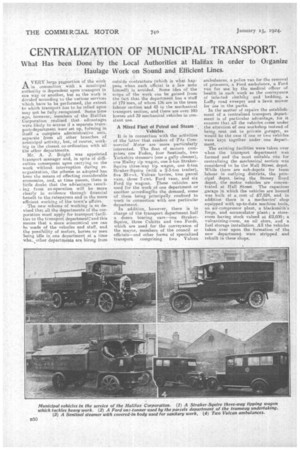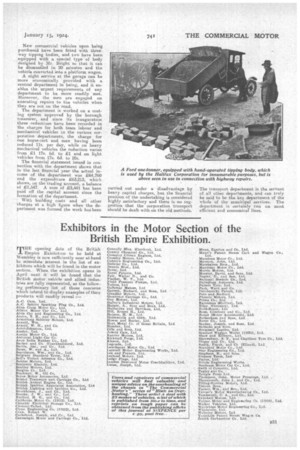CENTRALIZATION OF MUNICIPAL TRANSPORT.
Page 14

Page 15

If you've noticed an error in this article please click here to report it so we can fix it.
What Has been Done by the Local Authorities at Halifax in order to Organize Haulage Work on Sound and Efficient Lines.
A VERY large.proportion of the work in conuection with' a municipal authority is dependent upon transport. in one way or another, but as the work is divided according to the various services which have to be performed, the extent to which transport has to be relied upon may not be fully. recognized. Some time ago, however, members of the Halifax Corporation realized that advantages were likely to accrue if a separate transportrdepartment were set up, fotining in itself a complete administrative unit, .separate from all other branches of municipal activity, but, of course, working in the closest co-ordination with all the other departments. Mr. A. J. Bright was appointed transport manager and, in spite of difficulties consequent upon carrying on the work without interruption during reorganization, the scheme as adopted has been the means of effecting considerable economies, and, as time passes, there is Rae doubt that the advantages lesulting from co-operation will be more clearly in evidence through financial benefit to the ratepayers and in the more efficient working of the town's affairs.
The new scheme of working is so devised that, all the departments of the corporation must apply for transport`facilities to the transport department;and this means that a more economical use can be made of the vehicles and staff, and the passibility of motors, horses or men being idle in one department at a time whe.:..,.other departments are hiring from outside contractors (which is what happens when each official is a law unto himself) is avoided. Some idea of the scope of the work can be . gained from the fact that the department has a staff of 179 men, of whom 136 are in the team labour section and 43 in the mechanical transport section, and there are over 100 horses and 39 mechanical vehicles in constant use.
A Mixed Fleet of Petrol and Steam Vehicles.
It is in connection with the activities of the latter that readers of The Comwrereial Motor are more particularly interested. The fleet of motors comprises one Foden, four Sentinels, two Yorkshire steamers (one a gully cleaner), one Halley tip wagon, one 5-ton StrakerSquire three-way tip wagon, one 6-ton Stra,ker-Squire (with a 2-3-ton trailer), five 30-cwt. Vulcan lorries, two parcel vans, three 7-cwt. Ford vans, and six Ford tip wagons. These vehicles are used for the work of one department or another according to the demand, some of them being principally, confined to work in connection with one particular department. In addition, however, there is in charge of the transport department half a dozen touring cars—one StrakerSquire, three Cubitts and two Fords, which are used for the conveyance, of the mayor, members of the council or officials—and other forms of specialized transport comprising two Vulcan ambulances, a police van for the removal of prisoners, a Ford ambulance, a Ford van for use by the medical officer of health in such work as the conveyance of infected clothing and bedding, a Lailly road sweeper and a lawn mower for use in the parks. In the matter of repairs the establishment of a centralized transport department is of particular advantage, for it ensures that. all the vehicles come under the attention of one workshop instead of being sent out to private garages, as would be the case if one or two vehicles were kept together under one department.
The existing facilities were taken over when the transport department was formed and the most suitable site for centralizing the mechanical section was considered to be the Hall Street depot. While there are sub-depots for team labour in outlying districts, the principal depot being the Stoney Boyd depot, the motor vehicles are concentrated at Hall Street. The capacious garage in which the vehicles are housed was built at a cost of £7,824, and in addition there is a mechanics' shop equipped with up-to-date machine tools, an air-compressor plant, a blacksmith's forge, and accumulator plant; a storeroom having stock valued at £2,000; a vulcanizing-room, an oil store, and a. fuel storage installation. All the vehicles taken over upon the formation of the new department were stripped and rebuilt in these shops.
New commercial vehicles upon being purchased have been fitted with threeway tipping bodies, and two have been equipped with a special type of body designed by Mr. Bright so that it can be dismantled in 90 minutes and the vehicle converted into a platform wagon. A night service at the garage can be more economically provided with a central department in being, and it enables the urgent requirements of any department to be more readily met. Moreover, the men are engaged on executing repairs to the vehicles when they are not on the road.
The department is worked on a costing system approved by the borough treasurer, and since its inauguration three reductions have been recorded in the charges for both team labour and mechanical vehicles to the various corporation departments, the charge for one horse-cart and man having been reduced lls, per day, while on heavy mechanical vehicles the reduction varies from -21 17s. 6d. to .£1 and on light vehicles from 17s. 6d. to 10s.
The financial statement issued in connection with the department shows that in the last financial year the actual income of the department was £64,760 and the expenditure 863,213, which shows, on the trading account, a balance of £1,547. A sum of £3,441 has been paid off the capital account since the formation of the department. With building costs and all other charges at a high figure when the department was formed the work has been
carried out under a disadvantage by heavy capital charges, but the financial position of the undertaking is considered highly satisfactory and there is no suggestion that the corporation transport should be dealt with on the old methods. The transport department is the servant of all other departments, and can truly he said to be the key department of the whole of the municipal services. The department is certainly rim oa most efficient and economical lines.






























